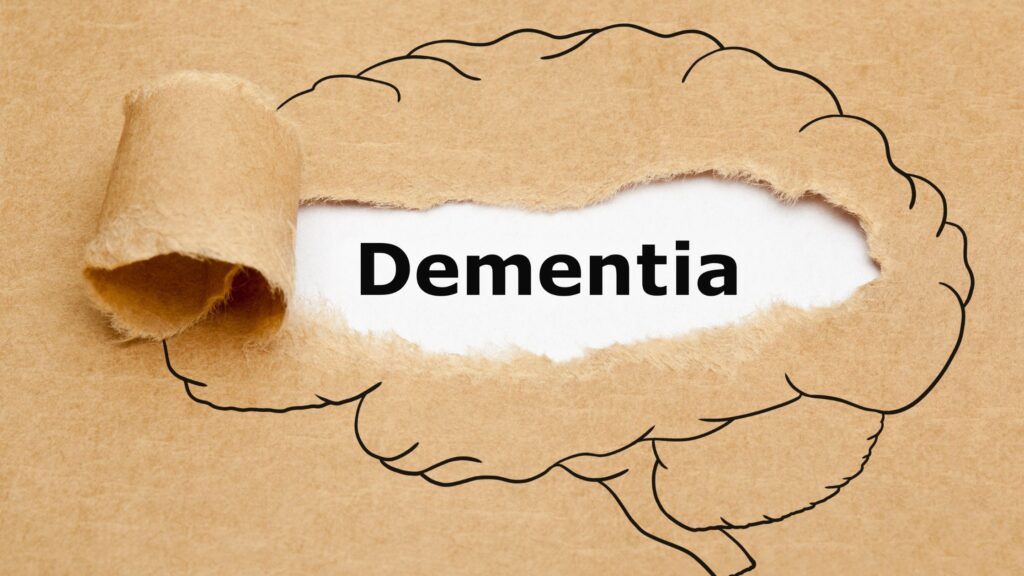Lapses in memory happen to everyone. You might misplace your keys, forget a name, or walk into a room and wonder why you came. But when changes in memory begin affecting daily life, relationships, or independence, they may signal something more serious than you think.
For millions of families worldwide, these concerns center around dementia. Understanding what dementia is, what causes it, and what increases risk can help you understand conversations with healthcare providers. It will also help you recognize warning signs and make informed decisions about next steps.
While only medical professionals can provide diagnosis and treatment guidance, having this background knowledge can bring clarity during uncertain times.
What is Dementia
Before examining the causes, it’s important to understand what dementia actually is. Dementia is not a single disease. It is a term for various symptoms affecting memory, thinking, and social abilities. These symptoms are severe enough to interfere with daily activities. These result from damage to brain cells and the connections between them.
It’s important to understand that dementia is not a normal part of aging. Some mild mental changes can occur with normal aging. But dementia represents a bigger decline that impacts a person’s ability to live independently. The symptoms are progressive, meaning that they usually worsen over time. However, the rate of progression varies considerably between individuals and depends on the underlying cause.
Dementia symptoms include:
- Memory loss
- Difficulty communicating
- Impaired complex thinking
- Trouble with planning and organizing
- Confusion about time and place
- Changes in mood or behavior
- Challenges with motor functions
The specific symptoms depend on which areas of the brain are affected and what’s causing the condition.
Primary Causes of Dementia

These are diseases and conditions in which dementia is the main illness.
Alzheimer’s Disease
Alzheimer’s disease is the most common cause of dementia. It accounts for 60-80% of all dementia cases. This progressive neurological disorder is characterized by the accumulation of two abnormal protein structures in the brain:
- Amyloid Plaques: These are sticky clumps of protein that build up between brain cells. These stop brain cells from talking to each other and cause swelling in the brain.
- Neurofibrillary Tangles: These are twisted fibers of tau protein that accumulate inside brain cells. When these proteins get tangled, they can’t keep the cell healthy (its internal structure), and the cell dies.
Scientists don’t exactly know what initiates starts these problems with the proteins. However, they suspect that genes, environment, and lifestyle all play a part in causing Alzheimer’s.
The disease typically begins with mild memory problems. It gradually progresses to affect language, reasoning, and eventually basic bodily functions. The progression is usually slow and steady, though the timeline varies between individuals.
Vascular Dementia
Vascular dementia happens when there is not enough blood flow to the brain. Brain cells don’t get enough oxygen and nutrients. This can happen because of:
- Stroke: Major strokes can cause sudden onset dementia. Many small strokes can cause slow memory loss.
- Small Vessel Disease: Tiny blood vessels in the brain can get damaged. They can’t bring enough oxygen and nutrients to the brain tissue if it happens.
- Heart Problems: Heart disease, high blood pressure, diabetes, and high cholesterol all make vascular dementia more likely by affecting blood flow to the brain.
The specific symptoms depend on which areas of the brain are affected by reduced blood flow.
Lewy Body Dementia
Lewy body dementia happens when harmful proteins build up in brain cells. These proteins are called Lewy bodies. These protein clumps mess up normal brain function and cause memory problems.
Common symptoms include:
- Memory problems
- Visual hallucinations
- Sleep disturbances
- Movement problems similar to Parkinson’s disease
Attention and alertness may fluctuate significantly from day to day or hour to hour.
Frontotemporal Dementia
Frontotemporal dementia results from the progressive deterioration of the frontal and temporal lobes of the brain. These are brain areas that control personality, behavior, and language. This type of dementia typically develops at a younger age than Alzheimer’s disease. It often affects people in their 50s and 60s. This type of dementia is often caused by:
- Protein Accumulations: Various abnormal proteins, including tau, TDP-43, and FUS, can accumulate in these brain regions.
- Genetic Mutations: About 40% of frontotemporal dementia cases have a genetic component, with mutations such as MAPT, GRN, and C9orf72.
This type causes personality changes or language problems. Memory often stays normal at first. This makes it hard to recognize early on.
Mixed Dementia
Mixed dementia occurs when a person has brain changes associated with more than one type of dementia. This often occurs in people over 80. The most common combination is Alzheimer’s with vascular dementia. Multiple types can make symptoms more complex and may affect how the condition progresses.
How Does It Affect Daily Life

With how dementia affects memory, the impact it has on an individual’s life spreads through every aspect of their life, especially as it begins to worsen. At first, changes may seem minor–like forgetting appointments or misplacing items more often. But as the condition progresses, daily tasks become harder: This can include:
- Managing Finances: Paying bills, budgeting, or handling transactions becomes confusing.
- Personal Care: Bathing, dressing, and grooming may eventually require assistance.
- Safety Concerns: Leaving the stove on, wandering outside, or forgetting to lock doors sets the affected individual at risk.
- Social Connections: Conversations may become difficult and may lead to isolation and frustration.
- Emotional Well-being: The individual may be subject to mood swings, anxiety, and depression.
These changes affect not just the individual, but also their family and caregivers. It often requires lifestyle adjustments and planning for future care needs.
When to Seek Help
Early intervention makes a difference. While occasional forgetfulness is normal, you should consider seeing a doctor if you or your loved one notices the following:
- Memory loss
- Difficulty following conversations or instructions
- Frequent confusion about time, place, or familiar faces
- Significant changes in mood, personality, or behavior
- Trouble performing routine tasks
A healthcare provider can perform tests to determine whether symptoms are related to dementia or another condition that may be treatable, such as vitamin deficiencies or thyroid issues.
Risk Factors
While researchers don’t fully understand all the factors that contribute to dementia, several risk factors have been identified through extensive research.
Age
Age is the strongest known risk factor for dementia. While dementia can affect younger people, the risk approximately doubles every five years after age 65. However, it’s important to understand that getting dementia is not guaranteed as you age. Many people live into their 90s and beyond without developing dementia.
Genetics and Family History
Having a parent or sibling with dementia increases your risk. This is more prevalent if the condition develops at a younger age. However, having family history doesn’t mean you will definitely develop dementia. Researchers have identified specific genes that influence the risk, but for most people, genetics represents just one factor among many.
Sex
Women are more likely to develop Alzheimer’s disease. About 3 in 5 vs 1 in 10 men. Women make up two-thirds of cases. While longer life spans play a role, factors like estrogen loss after menopause, greater rates of depression and social isolation, and possible treatment response differences contribute too.
Cardiovascular Health
Conditions that affect the heart and blood vessels can increase dementia risk. These include:
- High blood pressure
- High cholesterol
- Diabetes
- Heart Disease
Healthy circulation is essential for brain function. Conditions that affect circulation can impact brain health.
Head Injuries
Severe head injuries, particularly those involving loss of consciousness, have been linked to increased dementia risk later in life. The risk appears to be higher with more severe injuries and multiple injuries over time.
Lifestyle Factors
Research suggests that certain lifestyle factors may influence dementia risk. However, the relationships are complex and not fully understood. These factors include:
- Physical activity levels
- Social engagement
- Educational attainment
- Various aspects of diet and nutrition
Sleep Disorders
Poor sleep impairs the brain’s ability to clear harmful proteins like amyloid. Sleep apnea raises Alzheimer’s risk by up to 45%, and insomnia also predicts both Alzheimer’s and vascular dementia. Women with apnea appear especially vulnerable. Even long delays entering REM sleep have been linked to higher amyloid and tau buildup.
Can Dementia Be Prevented or Delayed?
There is no guaranteed way to prevent dementia, but research suggests certain habits can either delay or reduce risk of dementia:
- Stay Physically Active: Regular exercise supports blood flow and brain health. Get at least 150 minutes of moderate aerobic exercise per week.
- Eat a Healthy Diet: Brain-healthy eating patterns such as the Mediterranean diet or DASH diet are linked to better cognitive performance.
- Manage Health Conditions: Control blood pressure, cholesterol, and blood sugar.
- Get Quality Sleep: Aim for at least 7 to 8 hours of sleep. Poor sleep and sleep disorders like sleep apnea can impact memory.
What to Expect After Diagnosis
A dementia diagnosis often feels overwhelming. However, planning ahead helps families maintain stability and peace of mind. After diagnosis, these steps are important:
- Medical Guidance and Treatment: Your doctor will outline treatment plans. It may include medications to manage symptoms or slow progression. Regular checkups, cognitive assessments, and adjustments in care are essential for maintaining health and safety.
- Care Planning: Early planning ensures your loved one’s needs are met as the condition progresses. This might involve exploring different care options, such as in-home support, adult day programs, or residential facilities. They are based on what works best for the individual and family. Many families choose home-based care because it offers familiarity, comfort, and the opportunity to maintain independence as long as possible.
- Daily Living Adjustments: Safety becomes a priority. Simple changes like removing tripping hazards, organizing medications, and setting reminders can make a big difference. When additional help is needed, having trained support at home can prevent avoidable hospital visits and provide peace of mind for family members.
- Emotional and Social Support: Dementia affects more than memory, as it also has the capacity to change relationships and emotions as well. Counseling, support groups, and companionship (whether from family or professional caregivers) help reduce stress and improve quality of life for everyone involved.
Understanding Your Next Steps
Learning about dementia and its causes can help you better understand what you or your loved one might be experiencing. This knowledge can also help you prepare for conversations with healthcare professionals and understand the information they provide.
If you’re concerned about cognitive changes, consult a healthcare provider. They can conduct proper assessments, rule out other conditions that might cause similar symptoms, and provide guidance specific to your situation. Early consultation allows for better planning and access to resources that can help maintain quality of life.
Remember that every person’s experience with cognitive changes is unique. While this information provides a general understanding of dementia, only medical professionals can evaluate specific symptoms and provide appropriate guidance for individual circumstances.
For families in Oahu, Hawaii looking for additional support, professional home care services can complement your efforts while respecting your loved one’s routine and values. Absolute Home Care offers personalized care plans to ensure safety, comfort, and companionship. Learn more on our Customized Care page or call us at 1.877.800.9990.

